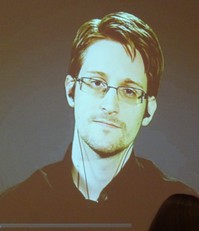Leap second
 "Fuck you, 2016," many people wrote on Twitter a couple of days ago in response to the news that Carrie Fisher had died. "Worst year ever," wrote veteran TV writer Ken Levine, in a fine display of chronocentricity. Worse than 1919? 1348? 72,000 B.C.?
"Fuck you, 2016," many people wrote on Twitter a couple of days ago in response to the news that Carrie Fisher had died. "Worst year ever," wrote veteran TV writer Ken Levine, in a fine display of chronocentricity. Worse than 1919? 1348? 72,000 B.C.?
That said, it has been a dramatic watershed year in many obvious ways. To focus on the net.warsish ones...
This was the year when the long-predicted threat that billions of connected devices would gang up on our global internet became real. Brian Krebs' summary captures the security disasters of the year nicely: billions of accounts hacked; the Mirai botnet which turned not only avoidable purchases, like "smart" thermostats and children's toys, but unavoidable bits of infrastructure, like network routers.
It's also - somewhat related - the year in which it became plain that Silicon Valley's ask-for-forgiveness-not-permission culture became physically dangerous. In the past, we've seen that habit of mind displayed rather frequently: Google, when it scanned millions of books without asking publishers or authors first, and when sending out cars to create Street View. Facebook, when its plan to merge its WhatsApp subsidiary's user data with its own, set off a skirmish with the EU. It's bad enough when the consequences of this mindset involve a bait-and-switch approach to people's privacy, but much worse when applied to catching cartoon monsters in real places, or two-ton chunks of metal tearing through a landscape filled with pedestrians and cyclists. Uber, however, insists its self-driving cars need no permits because they come equipped with humans ready to take over the wheel. Eventually, Uber took its cars away to more-welcoming (and emptier) Arizona.
 Readers of the most interesting book I read in 2016, Version Control, might note the prescience, although author, Dexter Palmer presumed that the parties behaving badly would likely be individuals, rather than large, money-losing companies whose owners think defying regulators is cool. The Imperical College professor Chris Hankin has made the point that in the cyber-physical systems developing now security and safety are merging, with consequences for both sides. This is therefore the turning point after which it is impossible to allow technology companies to continue living in their product liability vacuum.
Readers of the most interesting book I read in 2016, Version Control, might note the prescience, although author, Dexter Palmer presumed that the parties behaving badly would likely be individuals, rather than large, money-losing companies whose owners think defying regulators is cool. The Imperical College professor Chris Hankin has made the point that in the cyber-physical systems developing now security and safety are merging, with consequences for both sides. This is therefore the turning point after which it is impossible to allow technology companies to continue living in their product liability vacuum.
This is not the first year in which one nation tried to interfere with another's elections, but it's certainly the most cyberspatial.
GCHQ got the surveillance powers it and Theresa May wanted, as did the FBI. Assisted by the Chaos Computer Congress, travel data privacy expert Edward Hasbrouck demonstrated the fraud risks associated with Passenger Name Record data.
The US is starting to ask arriving foreign travelers for their social media pages. Yes, it's voluntary (for now), but anyone arriving in a foreign country, particularly one as fussy about foreigners as the US, assumes that everything on the form is legally required, and calling attention to yourself by being a refusenik is behavior reserved for the privileged. My personal, uninformed guess is that the responses will be used in a pilot program to prove the potential. The idea is wrong-headed in many ways, not least because it chills the right of association embedded in the First Amendment. But soon every country will be doing this, and the only people who will escape are the multi-citizenship "elites" everyone is supposed to despise now.
The first sign of the potential for in-home spying arrived in the form of law enforcement's desire for data collected by the voice-driven Amazon Echo home automation gadget. Like the social media request above, this is the beginning of a predictable but new privacy battle. No one buys an Echo so that the metadata it collects showing when they're home or the commands they send to Amazon's server can become part of their permanent data shadow, any more than they curated their Facebook page with an eye to its inspection by immigration. There are two collisions brewing here. First, the obvious privacy issue, but second the business challenge if people balk at buying devices that can be coopted against them. In both this and the social media/immigration case, the risk for the future is that we may lose the right to be unnetworked, along with moral crumple zones one of this year's better concepts. It's entirely believable that governments of the kind we see today in the UK and US will extend "Nothing to hide, nothing to fear" to "What are they hiding if they don't have a robot butler?"
Beyond that: ad fraud really took off; Russia was caught - and has now admitted - systematically doping hundreds of athletes; in retaliation for that exposure the Russian hacking team Fancy Bear published the details of Western athletes' Therapeutic Use Exception forms; Uber (again) spied on its customers; the UK still thinks it might like to withdraw from the European Convention on Human Rights; ICANN became independent; the FBI and Apple fought over encryption...
 And still, after all that, come Saturday night you're going to have to take an extra breath before you're done with 2016. Fifteen years of discussions on, and our clocks still just about chime with astrophysics. Happy leap second, everyone.
And still, after all that, come Saturday night you're going to have to take an extra breath before you're done with 2016. Fifteen years of discussions on, and our clocks still just about chime with astrophysics. Happy leap second, everyone.
Wendy M. Grossman is the 2013 winner of the Enigma Award. Her Web site has an extensive archive of her books, articles, and music, and an archive of earlier columns in this series. Stories about the border wars between cyberspace and real life are posted occasionally during the week at the net.wars Pinboard - or follow on Twitter.

 Two weeks after the Investigatory Powers Act received Royal Assent, the CJEU has ruled in the Watson case, which was backed by the
Two weeks after the Investigatory Powers Act received Royal Assent, the CJEU has ruled in the Watson case, which was backed by the  Like so many other things in contemporary public life, the two sides of this issue seem increasingly polarized. Anderson notes that all three reviews of the draft Investigatory Powers bill - the Intelligence and Security Committee of Parliament, the Joint Committee, and Anderson's own - agreed that bulk data retention was proportionate. The Home Office has said it will
Like so many other things in contemporary public life, the two sides of this issue seem increasingly polarized. Anderson notes that all three reviews of the draft Investigatory Powers bill - the Intelligence and Security Committee of Parliament, the Joint Committee, and Anderson's own - agreed that bulk data retention was proportionate. The Home Office has said it will  The late Simon Hoggart once wrote that the reason to take the trouble to debunk apparently harmless paranormal beliefs was this: they were "background noise, interfering with the truth". There were, at the time, many people who said that *of course* they did not take seriously the astrology column they read every morning. It was "just for fun".
The late Simon Hoggart once wrote that the reason to take the trouble to debunk apparently harmless paranormal beliefs was this: they were "background noise, interfering with the truth". There were, at the time, many people who said that *of course* they did not take seriously the astrology column they read every morning. It was "just for fun". The strategy to create the political aspect of this was clearly outlined in the
The strategy to create the political aspect of this was clearly outlined in the  Fake news is distributed by computers working exactly the way they are supposed to when large automated systems replace a previously labor-intensive business. The problem is not that today's ad agencies are robots that don't care about us. It's not the robots who don't care if a story might sufficiently persuade someone that Hillary Clinton is doing bad things via a pizzeria that they should
Fake news is distributed by computers working exactly the way they are supposed to when large automated systems replace a previously labor-intensive business. The problem is not that today's ad agencies are robots that don't care about us. It's not the robots who don't care if a story might sufficiently persuade someone that Hillary Clinton is doing bad things via a pizzeria that they should  This week, on one of the mailing lists I read, someone asked for recommendations for organizations to which they could make charitable donations as part of their holiday deliberations. The criteria: organizations involved in protecting online rights that can make progress on solving problems such as security, privacy, cyberbullying, fake news, and hate crimes.
This week, on one of the mailing lists I read, someone asked for recommendations for organizations to which they could make charitable donations as part of their holiday deliberations. The criteria: organizations involved in protecting online rights that can make progress on solving problems such as security, privacy, cyberbullying, fake news, and hate crimes.
 Late on Saturday night, a small laptop started having trouble connecting. This particular laptop sometimes has these issues, which I put down to the peculiarities of running wired ethernet into it via a USB converter. But the next day I realized that the desktop was timing out on some connections, and one of the other laptops was refusing to connect to the internet at all. An unhappy switch somewhere in the middle? Or perhaps a damaged cable? The wireless part of the network, which I turned on as a test, worked much better, which lent credence to the cable idea.
Late on Saturday night, a small laptop started having trouble connecting. This particular laptop sometimes has these issues, which I put down to the peculiarities of running wired ethernet into it via a USB converter. But the next day I realized that the desktop was timing out on some connections, and one of the other laptops was refusing to connect to the internet at all. An unhappy switch somewhere in the middle? Or perhaps a damaged cable? The wireless part of the network, which I turned on as a test, worked much better, which lent credence to the cable idea. This is the future we're facing. I bought the router in good faith from my ISP, which is a small, knowledgeable network consultancy run by two people I actually know personally to be smart and hard-working. They recommended it as a good, reliable router when I was switching to fiber. I did the right things: I configured the firewall to block all unnecessary ports, and changed its admin password. Reliable it has been, but neither they nor I could have guessed at its future as a security hole. So the problem, soon to be exacerbated by the Internet of Things, is not just that ignorant people buy poor-quality devices that prove to be a danger to themselves and others, but that knowledgeable people who take care to lock things down are being actively prevented from doing any better.
This is the future we're facing. I bought the router in good faith from my ISP, which is a small, knowledgeable network consultancy run by two people I actually know personally to be smart and hard-working. They recommended it as a good, reliable router when I was switching to fiber. I did the right things: I configured the firewall to block all unnecessary ports, and changed its admin password. Reliable it has been, but neither they nor I could have guessed at its future as a security hole. So the problem, soon to be exacerbated by the Internet of Things, is not just that ignorant people buy poor-quality devices that prove to be a danger to themselves and others, but that knowledgeable people who take care to lock things down are being actively prevented from doing any better. 